
A key element of secularism is opposing the age-old symbiosis between rulers (or governments) and state religion, each dependent on mutual legitimisation. King James I was under no illusion: ‘No bishop, no king.’ And as the American lawyer, writer, and orator Robert Green Ingersoll noted in 1881, ‘the throne and altar were twins – two vultures from the same egg.’
One of the most treacherous examples in the last century of this symbiosis was the way in which France’s Roman Catholic hierarchy propped up the Nazi puppet Maréchal Pétain during World War II.
I remind readers just how relatively recent this all is. For me it is not dusty academic history; as I will demonstrate, it is on the cusp of living memory. It is a case history of the fragility of liberty, something too many of our politicians – even those who claim to be historians – seem to be very careless about.
On 22 June 1940, Philippe Pétain signed an armistice with Hitler, conceding defeat. As a result, while the Nazis battled to overwhelm the northern half of the country, the southern half, euphemistically entitled ‘Free France’, was nominally under Pétain’s control, relieving Hitler of any need to deploy forces there. The Pétain regime was based in the spa town of Vichy, chosen for its many lavish hotels and transport links.
Pétain’s grip on power was tenuous and he needed all the support he could summon. Who better to fulfil this role than the Catholic Church, preaching to the nation from its pulpits each week? The purges against the Jews had already started, even in France, but that proved to be no impediment to the Church’s unconditionally supporting Pétain. And not just the French Church. In August 1941 Marshal Pétain enquired about the Vatican’s view of his collaborationist government’s anti-Jewish legislation. According to the report of the International Catholic-Jewish Historical Commission, top Vatican officials found ‘no objection to these restrictions so long as they were administered with justice and charity and did not restrict the prerogatives of the Church.’
The Church’s leaflet, addressed in 1942 to every French person, made just one point: that it was a religious obligation to support Pétain, almost as if he were a saint. He was already a national hero for his military role in World War I. The leaflet comprised sycophantic pro-Pétain statements from practically every senior cleric in the country. It is not hard to imagine devout matriarchs and other pious family members castigating detractors – for example, those in the resistance or protecting Jews – simply because anything short of unquestioning allegiance was portrayed as a sin against the diktat of the Church. In 1942, Bishop Lusaunier went as far as to direct that ‘the French should obey Pétain, not De Gaulle’ – who was leading the resistance from London.
It is not surprising that there is little or no evidence of a public backlash to the leaflet at that point. The Vichy regime was a police state, whose rules affected every single life. Even children had to sing a daily hymn to Pétain: Maréchal, nous voilà! (‘Marshal, here we come’).
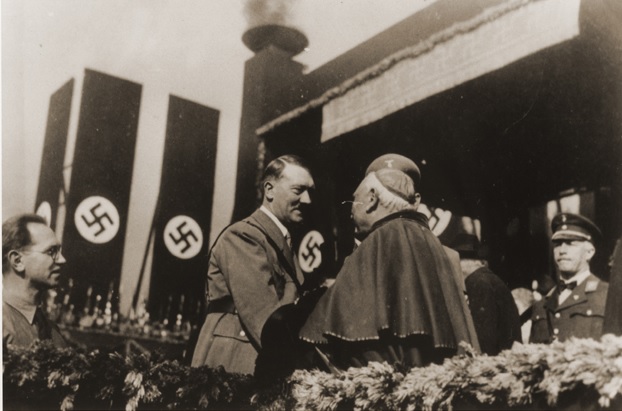
The history of the Catholic Church is replete with its support for the oppressors over the oppressed, going back at least to the Spanish and Portuguese conquistadores of South America in the 15th and 16th centuries. In the case of the Church’s collaboration with Pétain, its price for this Faustian pact was the reversal of laïcité, the secularist reforms of the opening years of the 20th century, from which the Church was still reeling. For example, France’s Third Republic had proscribed religious instruction or observance in publicly funded schools. On 9 July 1940, the Government of the Republic was transferred to Pétain’s control. Defeat was blamed on the Jews, Communists, atheists and Freemasons, and portrayed as divine retribution for the secularist reforms.
Religion was let back into publicly funded schools. Public funds were permitted to be used to finance religious schools. Pétain closed the teacher training establishments set up after the Revolution. From 1943, communes were required to pay for church maintenance. The Church was given back assets, particularly property, that had been sequestered by the Third Republic.
The Church will also have been delighted that the revolution’s battle cry of ‘Liberty, Equality, Fraternity’ was abandoned. Pétain replaced it with travail, famille, patrie (‘work, family, fatherland’). This ushered in a new moralism, an attempt to woo ardent Catholics, for example by discouraging divorce and demanding that women dressed modestly and bore children within wedlock. Jacques Duquesne, the author of a book on French Catholics during the occupation, believed that ‘one reason for the church’s mute acquiescence was its enthusiasm for Vichy’s moralizing, family-based, traditionalist agenda.’
Nothing in this regime actually operated as it was presented to the people. Although the cornerstone of the new regime was ostensibly Catholic, there were secularists among its ranks. And life in Vichy was as libertarian as it gets. Pétain’s private life was similar: he was not a practising Catholic, married a divorcée, and had affairs but no children.
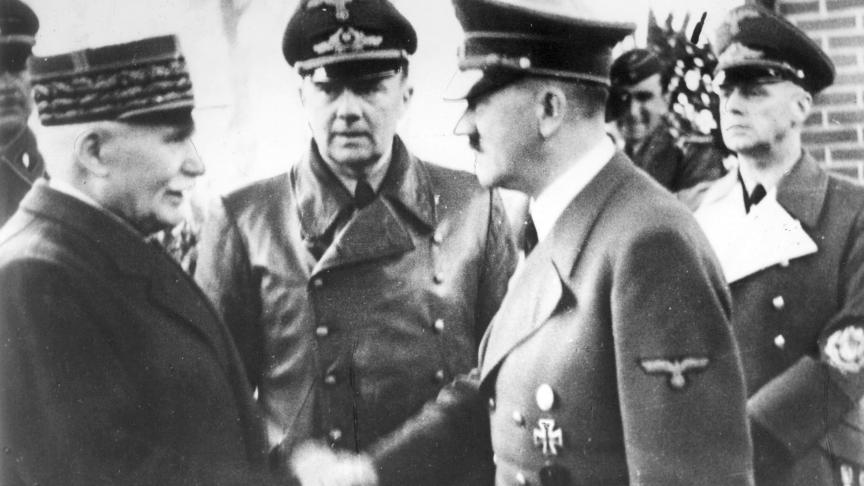
A few months after the leaflet’s release, the Church’s position unravelled a little. In July 1942, Archbishop Saliège of Toulouse, despite having supported Pétain, protested together with some other clerics, but no other prelates, about the Vel’ d’Hiv Roundup and the reportedly enthusiastic arrest of over 13,000 Jews by the French police without any coercion by the Nazi authorities. By mid-1943, however, control of the notorious Drancy transit camp northeast of Paris, from which 67,000 Jews were deported to Auschwitz, came under Nazi control, demonstrating conclusively that the Vichy regime was subservient to the Third Reich.
Tellingly, Saliège’s protests did not shame the Church into rethinking its collaborations. As late as February 1944 the bishops condemned the resistance army, despite the fact that the extent of Nazi atrocities was widely known by then, as was their all but certain prospect of defeat in Europe. This was just six months before the allies liberated Paris, and, soon after, France.
After the liberation of Paris on 25 August 1944, the Nazis deported Pétain against his will to Germany to head a ‘government’ in exile, but Pétain refused the role. In October, however, he was brought back to France for trial.
He played the wronged victim. ‘Power was legitimately given to me and this was recognised from the Vatican to the USSR.’ He was, if nothing else, a murderous anti-Semite. However the ‘Lion of Verdun’, as he had been known for his valour during World War I, saw himself as the country’s grieving father. On 17 June 1940, he had proclaimed, ‘France is a wounded child. I hold her in my arms.’ Five days later, as told by Martin Goldsmith in Alex’s Wake, he signed the Armistice with Hitler, at the latter’s request, ‘in the very same railroad car and on the very spot where, twenty-two years earlier, the Germans had surrendered at the end of World War I.’
Pétain may well have been motivated by an attempt to avoid France’s total destruction, and it is possible that he himself was the puppet of Prime Minister Laval. One of his main accusers was Paul Reynaud, briefly prime minister before Pétain took over, who had done his utmost to oppose the Nazis. Reynaud told the court, ‘never has one man done so much damage to a nation as Maréchal Pétain has done to the French.’
De Gaulle commuted the death sentence to life imprisonment. Pétain was exiled to prison on l’Isle d’Yeu, where he died in 1951. Laval was executed.
Astonishingly, there was no wave of anticlericalism at liberation. The Church emerged unscathed from its collaboration with Vichy because the Gaullists, socialists, communists and the Christian Democrats were all united in a government that needed the support of the Church.
It was not until 1997, on the site of Drancy transit camp, that French bishops asked forgiveness ‘for the collective silence [sic] of the bishops of France during these terrible years.’
As the Guardian reported in 2002: ‘Successive French leaders have had their own reasons for perpetuating the illusion that the Vichy regime was a victim of the Nazis and not an active participant in a Germano-Franco fascism. It was not until 1995, the year he became president, that Jacques Chirac broke the taboo of silence, admitting that “the French government had given support to the criminal madness of the occupiers”.’
Christian Eyschen, Secretary General of the secularist Federation Nationale de la Libre Pensée, cites numerous examples of Pétain’s concessions to the Church which have not been reversed, even now.
Unfortunately, my recent experiences of French justice lead me to go further. I have witnessed clerics not being held accountable under secular law for the sexual abuse of minors, nor for reporting their knowledge thereof as the law requires. In my opinion, the Church in France appears to be above the law, just as it was before the Revolution. The most spectacular example of this was the trial of the then most senior Catholic in France, Cardinal Barbarin (who had papal ambitions), for failing, as had been unlawful since 2000, to report abuse by a priest of numerous scouts over decades. Barbarin’s awareness of the abuse was not in contention, but the public prosecutor refused to initiate the case. Yet Barbarin was convicted after a private prosecution in 2019. In a bizarre development, however, the conviction was overturned by an appeals court, on the basis that Barbarin was not legally obliged to report the abuse allegations, because his victims were adults at the time when they alerted him. This decision was upheld on appeal by the Cour de Cassation, France’s highest court for civil proceedings.
As to living memory, in 2019 I stayed at a family hotel on the south side of Lac Léman (Lake Geneva) in the French spa town of Thonon les Bains in the department of Haute Savoie. It is famous for its maquisards, the guerrilla fighters opposing the Vichy regime, whose numbers included many Catholics. Some joined to avoid the ‘Compulsory Work Service’ (STO) that provided forced labour for Germany.
The patriarch of the hotel, a delightful man by then in his nineties, had been a maquisard. I shook his hand as he told me proudly of standing next to de Gaulle at the liberation of Paris.
Enjoy this article? Subscribe to our free fortnightly newsletter for the latest updates on freethought. Or make a donation to support our work into the future.


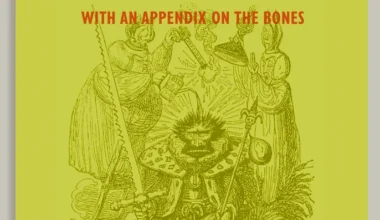
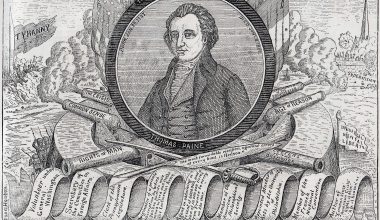
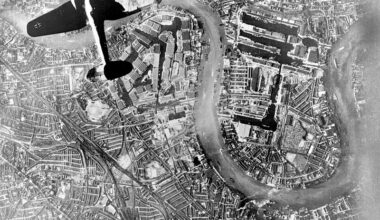
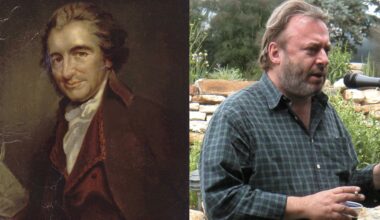
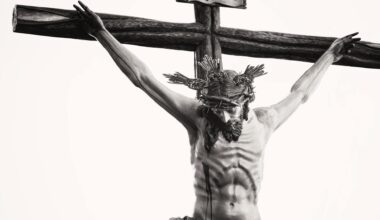
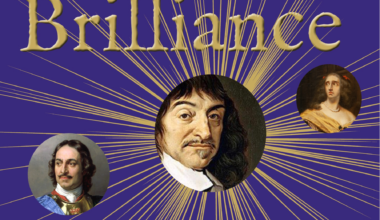
Your email address will not be published. Comments are subject to our Community Guidelines. Required fields are marked *
Donate